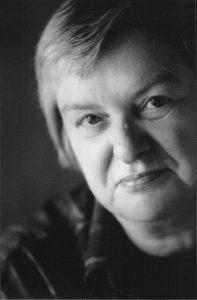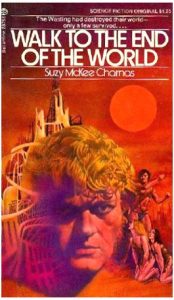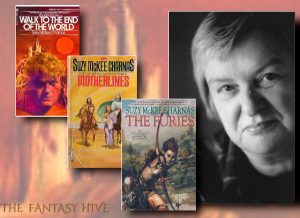Suzy McKee Charnas (1939-2023) OBITUARY
Suzy McKee Charnas (1939-2023)
 The Fantasy Hive was saddened to hear of the passing of Suzy McKee Charnas this January. Charnas was a key figure in feminist speculative fiction in the 1970s, and her Holdfast Chronicles remain important and influential works that demonstrate how speculative fiction can powerfully engage with ideas around gender.
The Fantasy Hive was saddened to hear of the passing of Suzy McKee Charnas this January. Charnas was a key figure in feminist speculative fiction in the 1970s, and her Holdfast Chronicles remain important and influential works that demonstrate how speculative fiction can powerfully engage with ideas around gender.
Charnas was born in Manhattan, and her education in history and economics and her experience in Nigeria working for the Peace Corps shaped her approach to speculative fiction. The first novel in the Holdfast Chronicles, Walk To The End Of The World (1974), imagines a horrifying future dystopia in which a misogynist ruling class of men keep women as breeding and labour slaves in a ruined post-apocalyptic Earth. The sequel Motherlines (1978) follows its protagonist’s escape from the dystopia of Holdfast into the nomadic tribes of cloned horsewoman who roam the apocalyptic wilds. These two novels were key texts in the boom of feminist speculative fiction of the 70s, kicked off by Ursula Le Guin’s The Left Hand of Darkness (1969) and including writers like Charnas, Joanna Russ and Vonda McIntyre. These authors and their works ushered in a new era of SF writing, in which science fiction could be used to examine ideas and assumptions about genre, and paving the way for later writers like Gwyneth Jones, James Tiptree, Jr and Margaret Atwood.
 Charnas, as one of the pioneers, struggled to get her books, particularly Motherlines, published by conservative publishers in a genre that was still considered to be largely read by teenage boys. The pioneering nature of her work was recognised in 1996, when Walk To The End Of The World and Motherlines were awarded retrospective Tiptree Awards. Charnas would return to the world of Holdfast with the equally powerful concluding novels The Furies (1994) and The Conqueror’s Child (1999), which are similarly brutal and unflinching in their exploration of gendered violence, conflict and control.
Charnas, as one of the pioneers, struggled to get her books, particularly Motherlines, published by conservative publishers in a genre that was still considered to be largely read by teenage boys. The pioneering nature of her work was recognised in 1996, when Walk To The End Of The World and Motherlines were awarded retrospective Tiptree Awards. Charnas would return to the world of Holdfast with the equally powerful concluding novels The Furies (1994) and The Conqueror’s Child (1999), which are similarly brutal and unflinching in their exploration of gendered violence, conflict and control.
Charnas’ imagination was too broad to be constrained by a single series. Her 1980 novel The Vampire Tapestry, made up of linked short stories, the last of which won the Nebula Award, is a bold and inventive reimagining of the vampire mythology from an anthropological perspective, while the Sorcery Hall series (1985-1989) proved that Charnas could adapt her writing to something approaching traditional fantasy without losing any of its passion or intensity.
She was a writer of brilliance and intelligence whose voice in speculative fiction will be sorely missed. The Fantasy Hive’s thoughts are with Charnas’ friends and family at this difficult time.


Wonderfully Written!